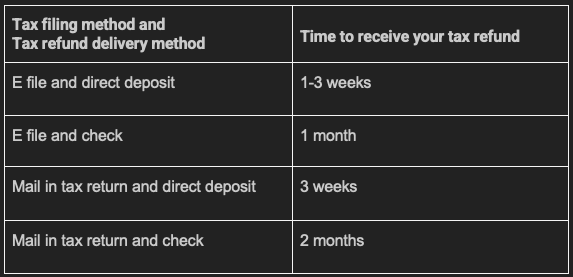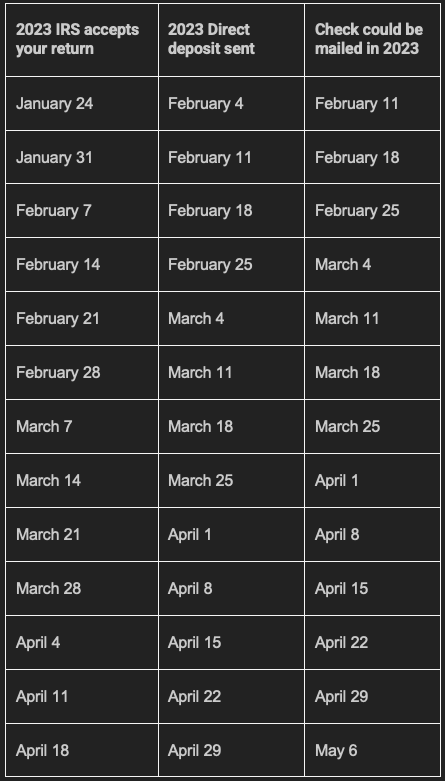How can you maximize your tax refund this year? Are you ready to maximize the tax refund you’ll get this tax season? Taking advantage of all available tax breaks is a great way to reduce your liability and, as a result, make the most of your return. Here are four tips to consider when seeking a larger refund – remember that for more long-term financial planning, consulting with an experienced advisor should be your top priority.
Let’s Maximize Your Tax Refund.
Are you hoping to get the most out of your tax return? Although it may be tempting to overpay in taxes, professionals do not advise this. This results in a refund from the government and can mean that your money is going to them instead of you. A better option is to adjust the amount taken out each month so that when tax season arrives, you’re not receiving a large return – allowing you to put the extra cash toward investments or other necessities during the year.
Are you hoping to get a bigger refund at tax time? Here are four actions that can help you maximize the money coming back from your tax return.
Firstly, Filing Status
Choose Your Tax Filing Status Wisely.
Your filing status can majorly affect the size of your tax refund, both for single and married individuals. For couples that are wed, filing joint taxes is usually the way to go. However, it might be more beneficial to file separately in some instances.
An option to consider when filing taxes is filing separately. This could be beneficial when one or both spouses have a lot of medical or business costs. By doing this, your adjusted gross income can get reduced, and the deductions you can make may increase due to them exceeding a percentage of your income.
When considering your filing status, it is important to look at the potential tax credits you may need to include by filing separately. To fully understand which option could be more beneficial for you, do some calculations or use a free tax return calculator to gain an estimate.
For those who are unmarried, it is worthwhile to investigate whether you are eligible for head of a household standing. Typically, this requires that more than half of the upkeep expenses for your home and applicable dependents have been shouldered by you in twelve months.
When it comes to tax season, the existence of a dependent can hugely impact your return. This could be a child or an elderly parent – anyone you support financially. Filing as head of household is worth considering since doing so grants you access to more generous deductions than single filers receive.
Second, Tax Credits
Maximize your tax refund with tax credits. Tax credits are a great way to decrease the overall amount of taxes owed to the IRS. On a dollar-for-dollar basis, your tax bill can be significantly lowered when these credits are utilized. For instance, say you owe $6,000 in taxes but then take advantage of a credit worth $1,000 – that reduces your total liability to just $5,000.
Common tax credits include:
- Tax credits can be a great way to reduce taxes owed. A popular type of credit is the Earned Income Tax Credit, which allows eligible tax filers to receive up to $6,728 for three or more qualifying children in 2021 and $6,935 in 2022.
- One of the most well-known tax credits is The Child and Dependent Care Tax Credit, which can reimburse up to $3,000 for one dependent or $6,000 for multiple dependents. This credit assists with childcare costs incurred during the year.
- Taking advantage of tax credits can be a great way to reduce your taxes. One popular option is the Child Tax Credit, which provides up to $2,000 per dependent in 2022 and was worth $3,600 in 2021. Your income will determine how much you may receive from the tax credit.
The amount of tax credits you can claim may be affected by various factors, such as income, filing status, and the presence of dependents. Other considerations for those seeking to use educational-based tax credits include timing and the eligible expenses.
Subsidies and other benefits may be available to those who opt to make certain energy-efficient upgrades in their homes. For instance, the Premium Tax Credit can help cover some expenses associated with purchasing a health care plan through the federal exchange.
Third, Tax Deduction
Tax Write-Offs Should not be Ignored. Although credits often yield a larger tax return than deductions, taking advantage of appropriate deductions is important. Deductions have the impact of reducing the amount of income that is subject to taxation, as opposed to just cutting down on what you owe in taxes.
Filing taxes can be confusing, particularly with the Trump tax plan’s doubling of the standard deduction. Generally, this makes taking the standard deduction the simpler option; however, itemizing may be more beneficial in cases where many deductible expenses are incurred.
The IRS allows you to deduct various costs related to work or other activities. Mileage, lodging, and home office expenses are deductible for self-employed individuals, just as donations to charitable organizations and mortgage interest can be taken off your taxes. Even student loan interest and gambling losses can be deducted – but the amount of each deduction does vary, so it’s important to keep appropriate records like receipts or bank statements to support your claims.
Fourth, the IRA
Putting away funds in a conventional IRA is an excellent way to grow your savings and take advantage of the extra tax benefit. You can contribute to your IRA for the past tax year until the April filing date and be eligible for a full or partial deduction. This kind of deduction goes above the line, permitting you to still claim it even without itemizing.
Regarding your retirement savings, a few tax credits are available that could help reduce your taxable income. One such credit is the Retirement Saver’s Credit, which applies to contributions to both traditional and Roth IRAs. However, your income must meet certain criteria to be eligible for this credit.
Many of us look for good ways to increase tax refunds during the tax season and make every penny count. Knowing which tax benefits you are eligible for can help you achieve that goal. Understanding the available deductions and credits could put more money back into your pocket.
Summary
Maximizing your tax return can be tricky business, but it is made much easier when working with the experts at PriorTax. Team of Free dedicated Tax Professional is knowledgeable and experienced in helping clients get every tax deduction and tax credit they qualify for – often resulting in a larger tax refund! Whether you’re filing as an individual, family, or even a small business owner, PriorTax will provide trustworthy guidance throughout the entire process so that you don’t have to feel overwhelmed while tackling your taxes.














